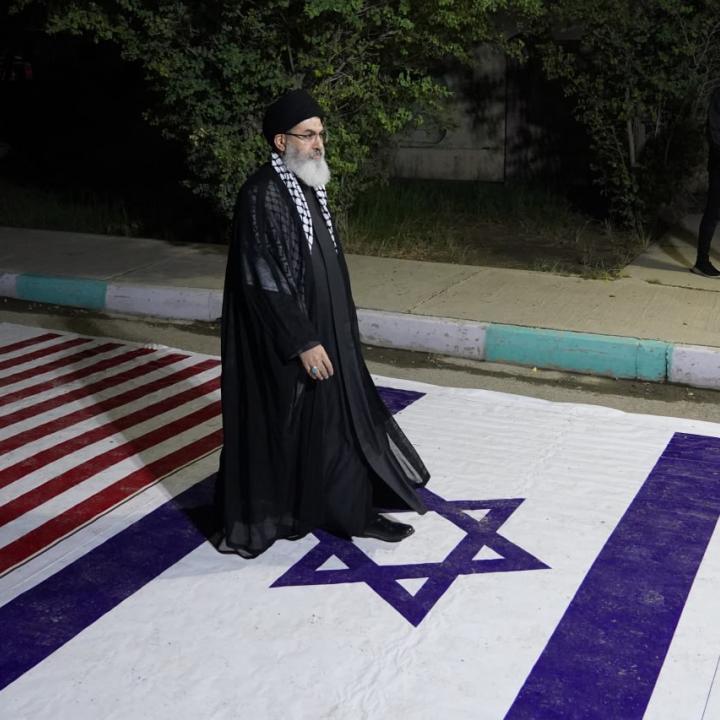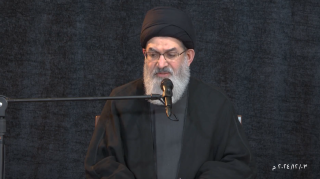
Hashem al-Haidari Calls for Preemptive Actions Against U.S. Embassy

One of Iran's most trusted lieutenants in the Iraqi militia scene is loudly rattling his saber against the U.S. presence in the Middle East.
Amid significant setbacks for Iran's so-called "axis of resistance," Hashem al-Haidari, leader of the Ahd Allah Islamic Movement in Iraq, has called for targeting all U.S. assets in the region, including embassies. His organization receives direct funding from Supreme Leader Ali Khamenei’s office in Tehran, positioning him as one of the most significant figures within muqawama (resistance) circles in Iraq. He frequently attends events held by Khamenei in Iran, often with second- or third-tier seating that underscores his prominence in the "axis." His views align closely with more radical elements of the Iranian regime, particularly within the Supreme Leader’s office and the Islamic Revolutionary Guard Corps (IRGC). This positions him as a key advocate for advancing these views in Iraq.
On December 3, Haidari addressed a group of seminary students in Iraq about recent developments in the region (Figure 1). He claimed that in the wake of recent events in Gaza, Lebanon, and Syria, the United States and Israel would likely turn their attention to Iraq, carrying out strikes against the muqawama and even potentially targeting Ayatollah Ali al-Sistani, the country's highest Shia Muslim authority. He further stated that the incoming Trump administration would soon usher in an escalatory phase, noting the president-elect's supposed statements to this effect. He also emphasized the need to “be ready and read the enemy with realism.”
According to Haidari, U.S.-Israeli plans for this "next phase" are built on three pillars: first, the “reactivation of terrorist takfiri [excommunicator] groups,” presumably referring to the Islamic State and other Sunni jihadist groups; second, Israeli strikes targeting muqawama and non-muqawama entities in Iraq; third, the assassination of prominent Iraqi figures, with Sistani being the primary target. He warned, “There is no ceiling for Israel and the United States,” signaling an unrestricted scope of action. He further stated, “If Iraq’s turn comes—and I believe that is inevitable—the United States embassy [in Baghdad]...whose content, number of personnel, officers, weaponry, and security remain vague...I believe, at zero hour, this embassy will transform into a military, security, propaganda, and destructive base leading [operations] in Iraq...if the decision is made to change the regime and the face of Iraq.”
Haidari then emphasized the importance of taking proactive measures against these purported plans. First, he highlighted the necessity of perceiving the danger, which he explains as “taking the initiative” and “shifting from a discourse of moderation and centrism to one of readiness.” He firmly stated that this is not a time to discuss de-escalation; rather, “It is time to take preemptive actions. When one sees the enemy approaching, it is only natural to confront the enemy, act first, and strike before being struck.” More specifically, he emphasized the necessity of taking “pre-emptive measures against the United States and terrorist groups in any country...The United States needs to feel the danger. Whether in its embassies, military bases, staff, officers, or soldiers, the United States must experience real danger in our countries to deter this vast global project.”
Clearly, Iran's self-styled "axis" is desperate to restore a modicum of deterrence against Israeli and U.S. action. For Iraqi militias, the United States is the main risk (for now), since the U.S. military knows exactly who to strike within their leadership if necessary and has the intelligence and reach to do so on any given day. The muqawama view the U.S. embassy in Baghdad as their best remaining point of leverage: a community of Americans who are always within striking distance, albeit well-fortified and covered by a U.S. deterrent capacity that has been vigorously exercised since 2019.




